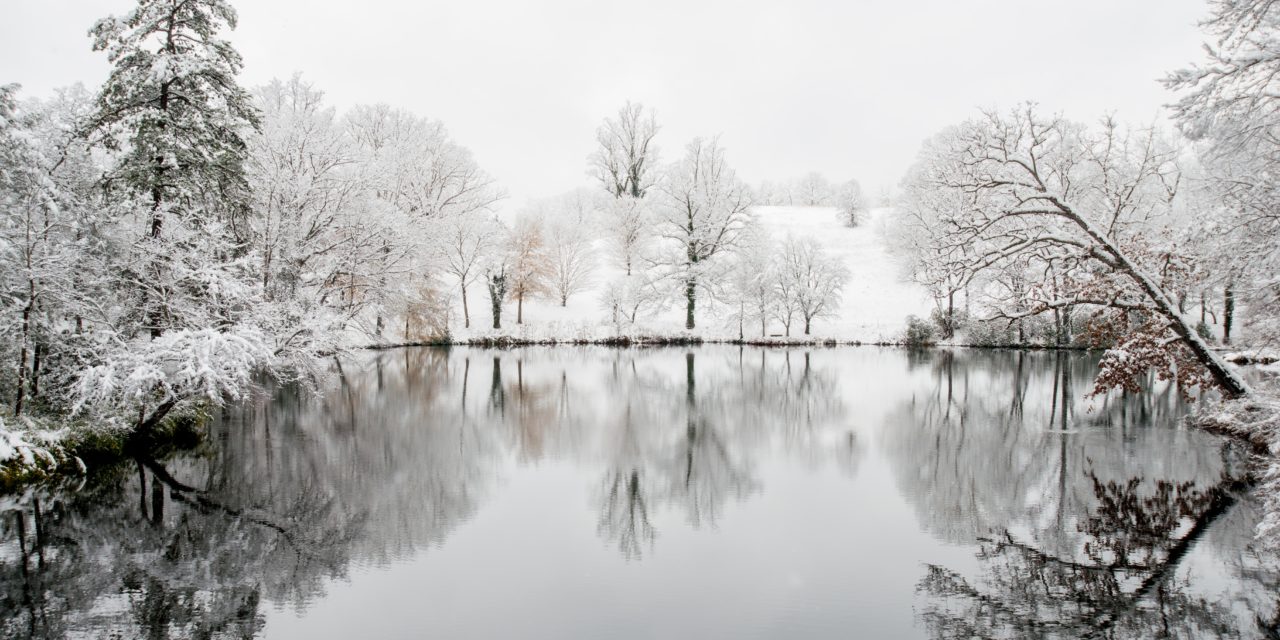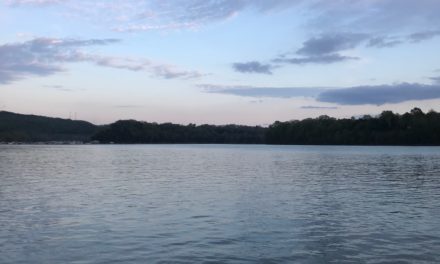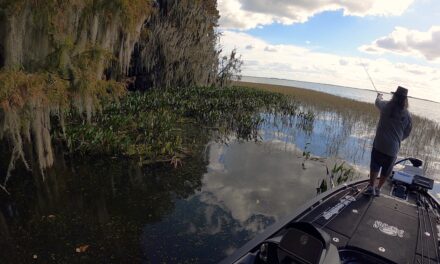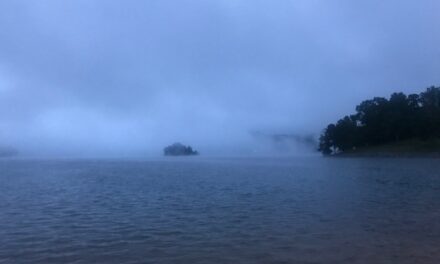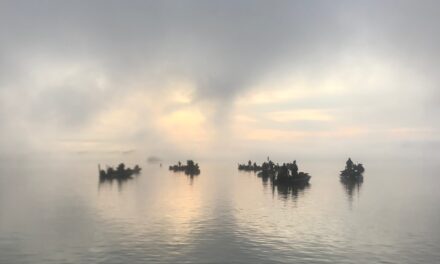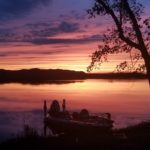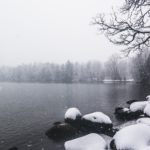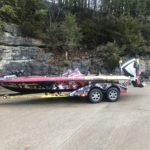It’s safe to say that no one would argue the fact that Winter can be tough on a fisherman in many ways. Its cold, hard on the boat, the fish are passive, the days are short, piling on the food during the holidays makes you feel too fat to fish…all of this adds up to a long sigh when that first biting wind hits you in the late fall. But Winter fishing is also a test of dedication and more importantly, the ability of an angler to be successful while presented with a myriad of difficult variables.
Yet even though Winter, no question, has more detractors than benefits, fishing actively during this time is essential to building the mental toughness required to be a great fisherman. If one were to consider what it takes to be a great angler, mental fortitude is at the top of the list, and winter fishing is mental fortitude practice.
Now there are lots of articles surrounding what it takes from a strategic perspective to fish well during the winter. Resources that discuss lake variation, winter patterns, the best approaches with tackle and equipment, etc. are plentiful. What is surprisingly rare are in depth discussions surrounding what it takes to get back to the dock if something goes wrong.
So let’s be very clear. Winter fishing is potentially dangerous and you can die as a result of a simple error in judgement, or a lack of preparation. Sadly, I can think of many occasions when I could have legitimately been injured or worse while winter fishing, but one afternoon stands out because it manifested both my carelessness and how changing winter weather can turn an enjoyable fish into a potentially threatening situation.
A close call
The trip in question took place in northern Minnesota during mid November in what began as a grey, yet relatively quiet afternoon. I departed in 38 degree cloudy weather with a bit of wind and ran southeast for about 25 miles before I got to a stretch of water I suspected would be productive. And I was right, it was a shooting gallery, the fishing was great, one of those days in winter where the fish are unusually active. Caught in the excitement of the fish, I stayed on and pressed until the sun had dimmed to the point when the already grey skies began to quickly darken in the east.
It was twilight. At this point, I did what nearly every bass angler has done at some point or other. I reviewed the distance and the fact that I have a ludicrously fast boat.
This is where an explanation of Minnesota winter is helpful. Put simply, Minnesota, while beautiful in Winter, can be incredibly elusive. While many times the onset of night can lead to a stillness in Winter, there are other times when the opposite occurs, particularly when a front is hitting in the late afternoon. And just as I was digesting how late it had gotten, the first heavy snows began to fall, coupled with a sudden brisk wind. We have all been there, that moment when you realized that you have stayed too long, and it was time to hurry, stow the gear, bundle up, start the boat and get moving. Now I was in a southeastern bay, and had to move north for 4 miles and then west for another 20 or so. The fear set in as I got moving and began to calculate how much time I had left before dark.
I remember thinking everything was fine as I was moving north, yes it was getting dark, yes it was considerably colder, yes there was a breeze, yes it was snowing, but despite all this everything would be just fine. Reality, however, hit me a minute later when as I came out from behind the western shore to turn west, and I was slammed by a whiteout wall of snow and wind along with 3 foot whitecaps rolling angrily across the lake. I can’t put into words how upsetting this moment actually was.
First thought…after the panic, a moment to criticize my stupidity, and the very possible visions of being thrown from the boat and freezing and/or drowning, was the rational acknowledgement that I was in serious trouble. Second thought, and after a serious assessment of my situation, it’s worse than I first thought. Darkness to my back, big water, wind, cold, wet, no survival equipment and a lake that was set into the middle of state land for most of the trip back. Add to that sporadic shallows, absent buoys that had been removed before the winter ice, and the near zero visibility as I was driving into the teeth of the wind against snow and sleet. I made it two minutes before I had to pull into a bay to get out of what could only be described as chaos. There I put on more layers, gloves, tried my cell, hoped that the boat wouldn’t quit on me and seriously questioning whether I could get back in these conditions. I fought my way West for 90 minutes on one of the roughest rides I have ever endured on the water. My boat was slammed so hard on the waves that there were times I seriously believed that it would break against the strain. I worried I would run aground and be thrown from the boat, and the entire time I was fairly certain hypothermia was all but inevitable. Let me put clearly the situation I had placed myself in that day.
- I was alone.
- I did not have a life vest on.
- I did not have my kill switch attached.
- My clothing was inadequate.
- I had no replacement clothing.
- My boat was not equipped with a radio.
- No one knew where I was fishing.
- I had no temporary shelter, no food, and a single bottle of water.
- My maps were not updated.
- I had no sources of light beyond the boat.
This one was the kicker. Because I did not have a lighter, there was no way to make a fire or see anything should the boat have failed me, and I was not even half way home before I was in complete darkness.
Now I have a 2014 Ranger 521 Z Commanche, and my boat is a tank when it comes to adversity of any kind. It was built correctly, is well maintained, and carried me home safely that night while withstanding a tremendous beating. Navigating completely by electronics, my Lowrance systems guided me to the dock via GPS. I arrived mildly hypothermic, soaked through, banged up, worried my boat was damaged from the excessive impacts, and generally miserable. I won’t even go into my wife’s reaction. And though I had a rough trip, I chalked it up to – ‘if you want to fish, you have to be tough’. The reality of the situation is that if just about anything had gone wrong, a great trip could have turned into a life threatening situation.
As a result of that night, I now make extensive preparations for winter fishing. Lets review changes made to the boat itself, storage, and my fishing policies.
Changes to the Boat
Modifications to the boat was the first order of business. Though some of them were a bit expensive, I believe that it was worth it in terms of both safety, and ultimately convenience in other areas. The changes were as follows.
- Added a second cranking battery, run in parallel. This increased available power by 50%.
- Augmented my Lowrance system with a weather module.
- Installed a Lowrance VHF radio and long range antenna attached to the left Talon.
- Shifted to a foot pedal for throttle control.
- Put a small locking carabiner on the end of my kill switch so the thing was not so hard to get on and off.
- I have a rescue ladder that hooks to the boat in case I go over the side. This ladder unrolls into the water making it easier to get back onboard in heavy clothing.
Regarding the kill switch, this little addition actually got me in the habit of attaching. I never realized the reason I never used it was because it was constantly so troublesome to hook on and off. Next I addressed items that might be required should I become stranded.
The Winter Pack
Every fall I remove a bunch of stuff that usually takes up space but has no actual function from my right front storage container and replace it with my ‘Winter pack’. The manifest is as follows.
- A two person all weather tent rated to zero degrees. I opted for a Marmot, but there are many options.
- A zero degree rated sleeping bag, again Marmot.
- 2 pairs of insulated socks.
- Pair of winter boots suitable for hiking. La Sportiva is my favorite brand here.
- Thermal pants and shirt. I like UnderArmor, but it is a matter of personal preference.
- Winter coat, Burton.
- Winter bib, Burton.
- Winter hat.
- Two Stormproof torch lighters.
- A small hatchet.
- A box of kindling
- A box of HotHands warmers.
- A jetboil camping stove (tiny)
- Non-perishable food that can be boiled in water.
- Two headlamps with extra batteries.
All of this is packed in two Simms dry bags and waterproof cases. This pack covers me if the boat fails and I need to layover for the night in adverse winter conditions.
Winter Fishing Policy
Next, I began to focus on winter policy. This one hurt a bit because I like to be flexible in my fishing, but at the end of the day, this is not tournament fishing we are talking about, the goal here is mental fortitude, and that concept can be both dedication and toughness, as well as wisdom and common sense. The policy is as follows.
- I never go more than 10 miles from the dock during winter. If I want to fish farther than 10 miles away, I trailer the boat to the area I wish to fish and put in.
- Before each trip, I inform my wife or someone responsible where I will be fishing, and when I will return. On my home lake, I have a VHF base station in place so I can communicate if necessary. On remote trips, I attempt to contact marinas and determine whether they are listening to the radio and on what channel.
- I wear, or have access to Striker Ice bibs and jacket during fishing. This is heavy, warm clothing that is also buoyant should I fall into the water. Should it be too warm for this suit, I try to wear a PFD though I admit I go without it far more often than I should.
- I absolutely never wear boots of any kind no matter how cold it is during the winter. Boots can pull you down if you go off the side.
- I set alarms on my phone to inform me when the fishing is done so I can avoid ever running again in complete darkness.
Number 5 is interesting because I used to have no problem running in the darkness until one night something crossed a dock light in front of me and I came off the gas just in time to miss a hunter in a small boat with no lights. That night I decided I was finished running in the dark altogether, not just during winter. Its one of the reasons I never fish in the middle of the night down south which is a popular activity during summer. I believe it is simply too dangerous to run in the dark regardless of the season.
In the end, there is no way to make fishing on desolate lakes, in frigid waters, during unpredictable weather patterns a safe activity. By realizing it is dangerous, and adjusting my preparations and policies to compensate for the increased risk, I minimize the dangers. The rest is out of my hands. I hope this article helps you plan your winter strategy so you can achieve success during the winter months while maximizing your safety.

